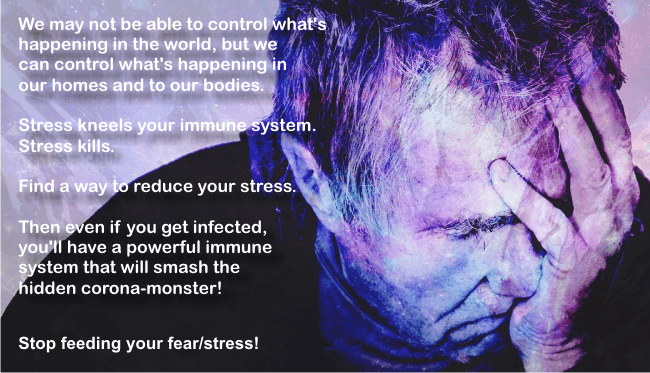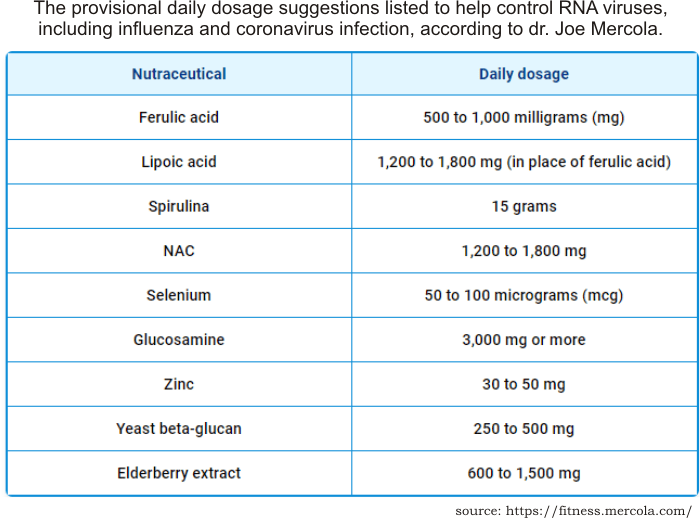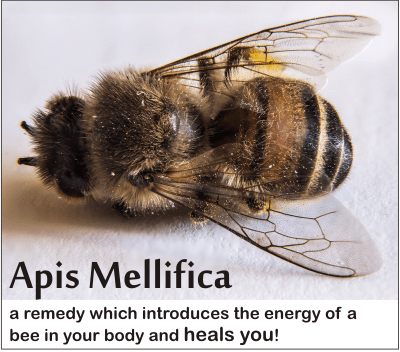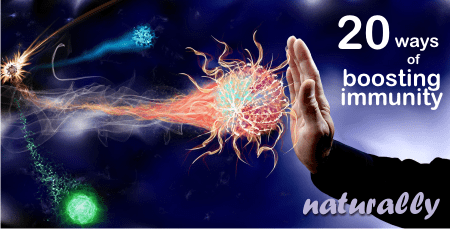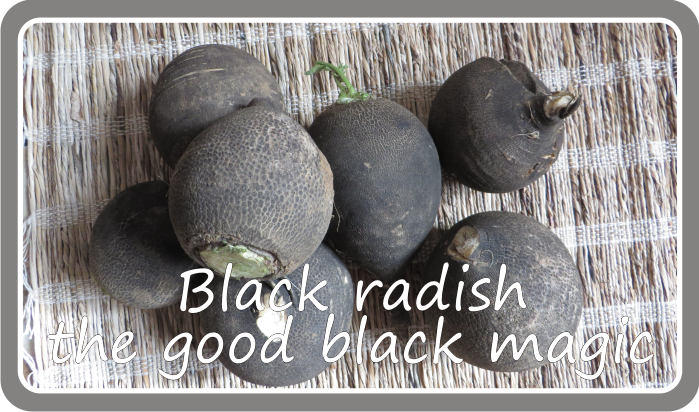What helps us in fighting coronavirus? Our immune system. What weakens our immune system? Stress!
This is the first things we should do to prevent coronavirus infection. Decrease stress/fear, thus increasing the power of our immune system.
This is not some mumbo-jumbo non-sense spoken at a conference by a modern spiritual coach. There is plenty of science-based evidence on this, search everywhere you like. Stress Weakens the Immune System – that is the cruel truth outlined by the American Psychological Association and all other psychological institutes, all over the world.
It is not the virus alone that kills us. It is ourselves, through how we respond to its threat.
We get afraid. We hear of its damages among other people (more or less like ourselves), we are continuously fed with worrying information, we suffer social disruption, we start being afraid of our own relatives and friends. 90% of the day we have coronavirus related thoughts and emotions. Even if we are not focused on its bad effects, we make jokes around it, and its thread continues to exist in our heads.
That’s reality.
We fear.
We have been programmed by society to fear the unknown. Because when you’re in fear, the best thing to do is run from the unknown. Because the animal in the wild who’s hearing something around the corner and doesn’t know what it is, it’s going to run because there’s a better chance of survival. So when we’re living by fear and the hormones of stress, we run from the unknown.
Coronavirus is a hidden monster we blindly fight. An enemy you cannot see. What can be more frightening? (yeah, where is an Avenger when you need one?) Our fear is justified. But is it going to help us with something? On the contrary.
What affects our immune system?
Aging processes and psychological stress.
Each can dysregulate immune function with a potentially substantial impact on physical health.
Worse, the effects of stress and age are interactive.
Psychological stress can both mimic and exacerbate the effects of aging, with older adults often showing greater immunological impairment to stress than younger adults. In addition, stressful experiences very early in life can alter the responsiveness of the nervous system and immune system. Even more, prenatal or early life stress may increase the likelihood of maladaptive immune responses to stress in late life. (Bellinger DL, 2009)
There is little we can do with our already aged organisms, we still have the power to control our psychological stress.
What’s the cause of our current stress?
1. coronavirus threat
2. social isolation.
Here is what health psychologists Sarah Pressman, PhD, Sheldon Cohen, PhD, and researchers at Carnegie Mellon University’s Laboratory found in the Study of Stress, Immunity and Disease, made on college students: “social isolation and feelings of loneliness each independently weakened first-year students’ immunity.”
What is stress?
In medicine and biology, stress could be defined as physiological responses of an organism submitted to constrain. It could be driven by psychological or physical factors, coined stressors that are categorized by the duration and course of the stimulus (discrete versus continuous).
An optimal response to acute stress events requires cross talk signals between the central nervous system
(CNS), the endocrine system and the immune system. Dysregulation of CNS-endocrine interplay can impact on the immune responses. The scientific names of hormons will not help us understand the situation better. What we need to know is that these are not traditional claims, but well-researched studies that all say the same: stress decreases our immune system.
Examples of stress factors scientifically studied:
Lots of studies have shown that all types of stress had a negative impact on the immune system.
There have been models of stress which included:
– Laboratory-induced stressors such as a speech stress test and mental arithmetic stress test [Burleson MH, 2003],
– Life stressors (such as marital conflict, medical students undergoing examination stress [Kiecolt-Glaser JK, 1998, Marshall GD, 1998],
– Caregivers of Alzheimer’s or dementia patients [Kiecolt-Glaser JK, 2003, Segerstrom SC, 2004],
– Mothers caring for severely disabled children (experiencing chronic psychological stress)
– Pain following surgery [Lutgendorf SK, 2004, McGuire L, 2006],
– Psychological stressors (such as depression, loneliness)
It has been shown that all these chronic stressors can:
– influence responses to infectious pathogens (reactivation of latent herpes viruses [Pariante CM, 1997]),
– limit the efficacy of immune responses to vaccination overtime [Li J, 2007, Glaser R, 2000],
– slow wound healing [Kiecolt-Glaser JK, 1995].
Moreover, stressful events and the related immune distress lead also to the increased production of pro-inflammatory cytokines [Kiecolt-Glaser JK, 2003, von Kanel R, 2006] that are associated with a spectrum of age-related diseases (frailty, cardiovascular diseases, osteoporosis [Ershler WB, 2000].
In the acute short-time stress, the transient psychological stressors, like academic examinations, can also slow wound healing (Kiecolt-Glaser et al., 1998; Marucha et al., 1998), an outcome with clear clinical relevance.
It is known that the immune system plays an important role in the early stages of wound healing by helping
to prepare tissue for repair and enhancing recruitment of certain key cells to the wounded area (Marucha et al., 2001; Singer and Clark, 1999).
In an earlier study performed among diverse groups, including healthy medical students and both asthmatic and healthy high school students, academic examination periods provoked short term changes in multiple facets of the immune response.
Such studies indicate that examination periods elicit a decline in the ability of white blood cells (lymphocytes) to perform their key functions (Kiecolt-Glaser and Glaser, 1991). Natural killer cell activity is similarly diminished
during examination periods (Kang et al., 1997).
Chronic stress is strongly and consistently linked with immune dysregulation that is greater in magnitude and longer in duration than that seen in response to acute stress.
Conflict within close relationships, for example, is a powerful predictor of immune dysregulation.
Both older and newlywed couples whose interactions in a laboratory setting are negative and hostile show greater hormonal and less adaptive immunological responses subsequent to those interactions than those with less negative interactions (Kiecolt-Glaser et al., 1997; Kiecolt-Glaser et al., 1993; Malarkey et al., 1994). Such dysregulation may reflect chronic patterns of conflictive interactions between couples, who tend to argue more intensely outside of a laboratory setting (Margolin et al., 1989).
What happens to people who suffer chronic stress (lasting one month or more)?
– are at particularly strong risk of developing illness when exposed to an infectious agent (Cohen 2005).
– have slower wound healing. Blister wounds induced on the forearms of married couples healed more slowly following conflictive as opposed to supportive discussions and even more slowly for individuals who evidenced more hostile and negative interactions during both types of discussions (Kiecolt-Glaser et al., 2005).
– Death of a spouse, parent, or child is also associated with dysregulation of several measures of immune functioning (Graham et al., in press-a). For example, healthy individuals who recently experienced unexpected bereavement show lower natural killer cell and lymphocyte activity compared to non-bereaved matched controls; this deficit was observed 40 days after the death and in some cases persisted for 6 months (Gerra et al., 2003).
One of the worst form of chronic stress involves caregiving, such as providing care for a spouse with dementia, is also associated with immune dysregulation. Caregivers are often socially isolated (Ell, 1996), experience overwhelming demands on their time and emotional, financial, and physical resources, and experience high levels of depression and anxiety (Bodnar and Kiecolt-Glaser, 1994).
Compared to well-matched controls, spousal caregivers show poorer immune function, including responses to virus and vaccine challenges (Glaser et al., 2000; Vedhara et al., 1999), dysregulation of natural killer cell activity (Esterling et al., 1994; Esterling et al., 1996), and slower wound healing (Kiecolt-Glaser et al., 1995).
· Moreover, several studies indicate that spousal caregivers are more likely to have elevated levels of inflammatory markers in their blood (Kiecolt-Glaser et al., 2003; Lutgendorf et al., 1999; von Kanel et al., 2005), putting them at greater risk for cardiovascular and other age-related diseases (Harris et al., 1999; Pradhan, 2001).
The immune dysregulation of this intense chronic stressor can continue at detectable levels even several years after the spouse dies and caregiving activities have ended (Kiecolt-Glaser, 1999).
· The same happens among caregivers of chronically ill children, who also relate to important immunologically-relevant health outcomes. Among healthy mothers, a subset of whom were providing care to a chronically ill child, perceived stress and chronicity of stress were associated with lower telomerase activity and shorter telomere length (Epel et al., 2004). In conjunction with immune dysregulation found among caregivers of spouses, these
results suggest that chronic stress may cause premature aging (Glaser and Kiecolt-Glaser, 2005).
So, you see, stress has been long studied and associated to a considerable weakening of our immune system. And even if we don’t admit it, day by day we are feeding our virus related stress, turning it from an acute stress to a chronic stress, which already has been lasting for more than 3 months.
What to do? Be aware of your thoughts. Realize that this virus is present in your mind 90% of all your time, preparing its environment for the time when it gets close. Stop it.
It is in your power.
If there is nothing you can do to stop the pandemic (except from staying inside), there are things you can do for yourself. I get it, you can’t stop smoking, you can’t stop eating sweets or drinking beer, but you DO have the power to shape your reality/environment the way you want it.
You already know what to do to prevent yourself from getting infected. Stay indoors, wash your hands etc. There are some alternative activities that you can also do, like exercise, eating healthy, give up smoking and drinking.
You can also take vitamins and supplements (see here How to fight flu naturally). Focus on Liposomal Vitamin C, Vitamin D3, Magnesium, Zinc, Quercetin, Ashwagandha and Black Elderberry.
If you own a sauna, take 3, 4 hot saunas per week. (Or hot baths. Or exercise till you sweat a lot. See this video for more suggestions. The idea is to raise your body temperature 3 times per day.)
And sleep well!
“To prevent COVID Medical Tribune (JAPAN) publishes 3,000 MG per day recommendation for Vitamin C along with vitamin D (2,000 IU), zinc (20 mg) selenium (100 mcg) and magnesium (400 mg).” dr Andrew Saul
However, I know for sure and you know it, too, if it has to happen, it will happen. No matter what you do.
Simply because you cannot control everything. And this is a case which is not in your control.
So, why worrying?
How to control our stress? How to stop worrying?
You can choose to stop reading all the non-sense messages you get from FB, Twitter or other channels. Stop laughing or searching for the associated jokes. Nothing related to Covid. Be crazy here, be against everybody else. Choose not to know. (Well, ok, maybe at the end of the day you can read some news. Preferably on CDC website)
Instead, watch comedies, read good books (not tragic ones!), listen to music, paint your house, color, take online dancing classes, play chess, monopoly or whatever, exercise (30 minutes of physical activity a day for adults and one hour a day for children), bake goodies, start learning a foreign language! Why not? This is a long term investment, something that tells your brain that you are getting ready for a wonderful future, when you will be visiting a certain country. Like Greece. Or Japan.
Try tai-chi!
Obsess on not carrying about this virus. It doesn’t matter if it was man-made, if it’s just a mutation, if they want to kill us after with a vaccine or simply want our good, it just doesn’t matter. You cannot control these things, stop trying to solve the unsolvable.
Your worst enemy in this pandemic is your own mind.
When we are in a state of fear, typically what we do is select the worst-case scenario & then prepare ourselves emotionally for when it occurs. Now when we get it right, we are proud of ourselves and say, look how smart I am, I predicted that!
It is simply a way of protecting us. You are combining that thought & feeling and you move into a new state of being. What’s the result? This will knock your brain & body out of balance, just by thought alone.
Stop saying “I’m afraid”, “It’s gonna kill us all.” “The current pandemic is freaking me out. “The economy is gonna collapse”, “we will be very poor”, “My worries about the future is eating me up inside” and so on.
Stop saying bad things about what is or what will be happening!
Marisa Peer, one of UK’s top therapists, says we should watch out to our language very carefully, because language has the power to shape reality. What?! Yes, “Science calls it Neuroplasticity – if you do (or think about) certain things for long enough, new connections are formed in your brain. It is how we learn. First, it becomes your belief, then your habit,and then your life.”
Stop attracting these things into your life, stop calling them. Remember the words of Joe Dispenza:
Where you place your attention
is where you place your energy!
Place your energy on enjoyable things. On gratitude for having a good husband, a good child, on the privilege of living a wonderful life or on playing with your dog. Find something that brings you pleasure.
It’s easy to get frighten. It’s easy to get scared and angry. Everybody falls into this automatic behavior.
Be different. Be crazy. Choose how to behave.
The invisible monster we are all fighting with will fade away. They all did.
“Life is 10% what happens to you and 90% how you react to it.”
Charles Swindoll
——————————-
A simple technique that can help activate your parasympathetic nervous system, thus calming you down, is the Neuro-Emotional Technique’s First Aid Stress Tool, or NET FAST, demonstrated in the video above. Firstaidstresstool.com also provides an excellent printable summary with visuals of the technique,1 which even a young child can do. Here is a summary of the FAST procedure:
- While thinking about an issue that is bothering you, place your right wrist, palm up, into your left hand. Place three fingers of your left hand onto the area of your right wrist where you can feel your pulse.
- Place your open right hand on your forehead. Gently breathe in and out several times while concentrating on feeling the issue that bothers you.
- Switch hands and repeat Steps 1 and 2.
——————————-
Daydream!
Nothing works best in relaxing your body if you daydream/imagine to be in your perfect spot, surrounded by loved people, doing whatever makes you happy. Here is what relaxes me:
Old people
Old people are most affected in fighting coronavirus. Why? Because of their comorbidities (associated diseases) and weakened immune system.
Old people are just victims here. They do not get that stressed, as the rest of us does, (probably because they are already old, sick and are more comfortable with a death idea) but their immune system is already weakened. It comes with age.
Aging profoundly impairs the immune system, being characterized by many changes in haematopoiesis, adaptive and innate systems, associated with pro-inflammatory environment. Moreover, aging is the main factor risk for chronic diseases.
To them, the capacity to overcome an acute stress – such is this virus threat- depends on their reserve capacities, which are impacted by many factors such as the degree of physiological aging and chronic medical condition. These two factors are profoundly dependent on genetic background, epigenetic, immunological, biological and environmental factors.
But, Japan is the country with the highest life span and during this pandemiy it is lower old people death than any other country. Why? Because they keep active all the time, they work more (retire after 70 yo), do sports and know how to relax. Call it meditation, yoga, tai-chi, it doesn’t matter.
So, yes, old people can turn themselves from being passive auto-pilot victims to active relaxed optimistic ones. Which can reshape their reality and future.
We may not be able to control what’s happening in the world, but we can control what’s happening in our homes and to our bodies. Stress kills more than the virus. Find a way to reduce your stress. Then even if you get infected, you’ll have a powerful immune system that will smash the invisible corona-monster!
And the people stayed home
by Kitty O’Meara
And the people stayed home. And read books, and listened, and rested, and exercised, and made art, and played games, and learned new ways of being, and were still. And listened more deeply. Some meditated, some prayed, some danced. Some met their shadows.
And the people began to think differently.
And the people healed. And, in the absence of people living in ignorant, dangerous, mindless, and heartless ways, the earth began to heal.
And when the danger passed, and the people joined together again, they grieved their losses, and made new choices, and dreamed new images, and created new ways to live and heal the earth fully, as they had been healed.
I choose to believe this.
Related article: What is a virus – explained in plain English. Coronavirus: forms, treatment, prevention.
References:
Image by Free-Photos from Pixabay
Tinhinane Fali, Hélène Vallet, Delphine Sauce. Impact of stress on aged immune system compartments:
Overview from fundamental to clinical data. Experimental Gerontology, Elsevier, 2018, 105, pp.19-26.
10.1016/j.exger.2018.02.007. hal-02352184f
Stress, Age, and Immune Function: Toward a Lifespan Approach
Stress Weakens the Immune System
Chronic stress modulates the virus-specific immune response to latent herpes simplex virus type 1., Glaser R 1997

